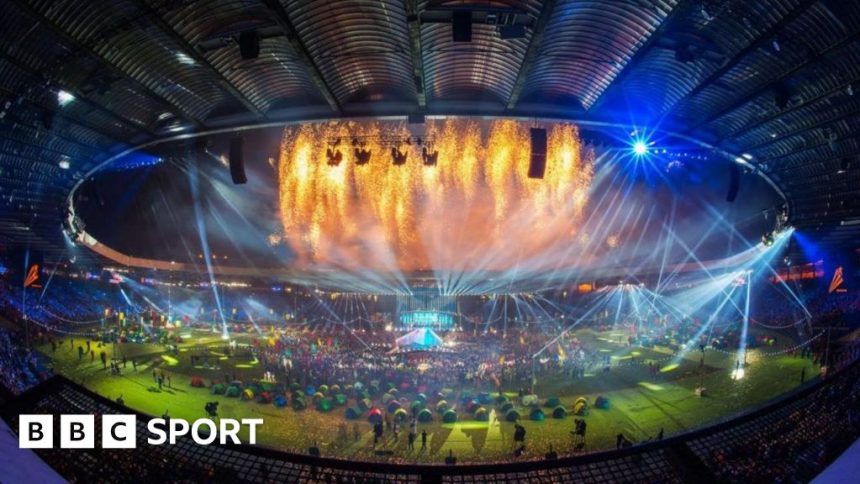Glasgow missing out on £100m Games would be ‘travesty’

Glasgow hosted the Commonwealth Games in 2014
-
Published
Missing the chance to host the 2026 Commonwealth Games in Glasgow would be a “travesty”, and would put the future of high-performance sport in the country “under serious threat”, the Scottish government have been warned.
Talks have been ongoing for several months about hosting a scaled-back version of the event in Scotland after the Australian state of Victoria withdrew as hosts last July because of rising costs.
As negotiations drag on, First Minister John Swinney warned, external on Thursday that the Scottish Government will not commit any public funds to the bid.
However, Commonwealth Games Scotland (CGS) has reiterated that its “innovative, cost-effective and sustainable” proposal would not need any government money to bring the Games back to Glasgow 12 years after it last staged them.
-
-
Published25 July
-
-
-
Published12 April
-
-
-
Published8 April
-
Furthermore, it said that not capitalising on in excess of £100m of investment from the Commonwealth Games Federation (CGF) would be “short-sighted” and called on Holyrood to act quickly.
“The decision to host the Games has been sitting with the Scottish government since May,” said Ian Reid, the chair of CGS.
“And we have worked tirelessly to address all questions and concerns raised across the past few months. However, the window of opportunity is fast closing.
“It would be a travesty if instead of grabbing the opportunity of over £100m investment, we chose to let it go and instead be left needing to find millions elsewhere to upgrade public facilities.
“A decision over the coming weeks is critical. We believe the concept is a no brainer and we are calling on the government to not waste the unique opportunity which is in front of us.”
BBC Sport Scotland has approached the Scottish government for comment.
How would a Glasgow Games work?
Instead of the 20 sports included at Birmingham 2022, the cut-down Glasgow event would involve just 10 different disciplines.
Only four venues would be used – including Scotstoun Stadium and the swimming pool at Tollcross – each of which would be in an eight-mile corridor within the Glasgow City Council boundary.
And existing accommodation would be used to house a smaller number of athletes and support staff.
How would it be funded?
The cost of the event has been estimated as approximately £114m, a total that includes all Games costs, including security as a well as a contingency fund.
The majority of that – around £100m – would be covered by compensation recouped by the CGF after Victoria’s withdrawal, with the rest funded by commercial opportunities.
As part of the bid, Tollcross and Scotstoun would be upgraded, while CGS say staging the event would also bring an estimated economic value of more than £150m to the area.
How did we get here?
After a prolonged search, the Australian state of Victoria agreed to host the Games in April 2022.
However, little over a year later, they declared that the projected cost had tripled and become “well and truly too much”.
Singapore and Malaysia both ruled out stepping in to save the multi-sport event, before Glasgow said it could hold a curtailed offering should no other host be found.
The multi-sport event, which welcomed competitors from 72 countries in Birmingham, has taken place every four years since 1930 and has only ever been cancelled during the Second World War.
What do Commonwealth Games Scotland say?
CGS chair Reid acknowledged that the event would “look and feel different” to the last time it was held in Glasgow in 2014 but warned that the “the 2026 Games hang in the balance”.
He added: “Scotland has been offered £100m+ of inward investment. To potentially turn down such a significant sum of money is short-sighted.
“It would be a travesty if instead of grabbing the opportunity, we chose to let it go and instead be left needing to find millions elsewhere to fund the essential capital work needed to upgrade public facilities in the coming years, and leave hundreds of Scottish athletes, aspiring and established, without an avenue to compete for Scotland on the international stage.
“We believe the concept is a no brainer. We are calling on the government to not waste the unique opportunity which is in front of us.”





